Peter MALONE
Saturday, 18 September 2021 19:49
Theif, The/ 1952
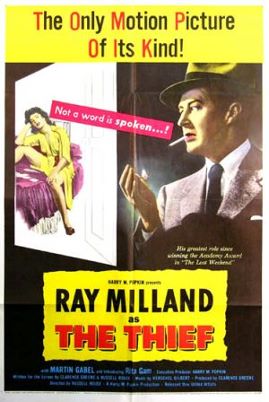
THE THIEF
US, 1952, 86 minutes, Black and white.
Ray Milland, Martin Gabel, Rita Gam.
Directed by Russell Rouse.
The Thief was an experiment in 1952. Only 25 years after The Jazz Singer, here was a film which had no dialogue at all. It did have sound effects, phones ringing, screams… And it had an atmospheric musical score to highlight moods and tensions. However, the film relied on the performance of Ray Milland who communicated his interior states of mind, imagination and fear by his body language and facial expressions. It is a very interesting performance, worth study.
The film was not popular at the box office, too demanding for an audience which had become used to dialogue. The theme was topical for the early 1950s, the anti-Communist feeling, The House of Un- American Activities hearings, the beginning of the Mc Carthy era.
Ray Milland portrays a nuclear scientist who has been honoured for his work. But, without any explanation given, we see that he is being controlled by agents, presumably Russian sympathisers, especially Martin Gabel, and the chain of passing on photographic information. The scientist does his own work, but photographs documents and gives them to the contacts.
The dramatic key to the film is that one in the chain has an accident, his camera is discovered, the FBI come in for investigation, the scientist is followed – as he changes apartments, gets a false passport, is due to ship out to Cairo. There is quite a climax in the Empire State Building, the scientist moving towards the roof, an FBI agent in pursuit.
Of interest, the film introduces Rita Gam. She has quite a small role but a striking visual one.
The film was co-written by producer Clarence Greene and director Russell Rouse.
1. Atmosphere of Atomic Research, Nuclear Espionage in the 1940s and 1950s? Communist Fears?
2. An experimental film, absence of dialogue, focus on action, the sounds, especially the phone? The musical score and its contribution to atmosphere and tension?
3. Ray Milland’s performance, his ability to communicate without words, action and exterior behaviour, the suggestion of the interiors, waiting, listening? His scientific work? The illegal photographs? His body language?
4. The contact, in the street, dropping the paper, the phone calls? The several times that he did this?
5. The process of passing on the photos, the chain of people, their activities? Alan Field and his putting the photos in a safe place, in the library? The various people and their responses?
6. Fields and his worries, more photos, his hiding in the room of the Professor, leaving the camera on the desk? Recovering it?
7. At home, his torment?
8. The accident, the consequences? For Field? For the ring?
9. The FBI, getting the camera, the examination of the photos, the arrest of the wrong scientist? Field watching?
10. Field, the information about the key, going to the station, recovering the case, the clothes?
11. Going to the new apartment, the girl and her sexy look, provocative? His watching?
12. The FBI, following, field avoiding them?
13. The message to go to the Empire State Building? The tourist deck? His being followed, going through the door and up the steps, the dangers, at the top? The agent following, falling, his death? The effect on field?
14. The return to the apartment, the relief, preparing to go to the wharf, changing his clothes?
15. Night, the ship, his watching, thinking, deciding to leave and going to the FBI?
16. How successful a cinema experiment, the relying on the techniques of silent film without captions?
17. The 50s, the Cold War, attitudes towards the Soviet Union? The actual spies from this period and their later being sentenced?
Published in Movie Reviews
Published in
Movie Reviews
Tagged under
Saturday, 18 September 2021 19:49
Hollywood Revue of 1929, The
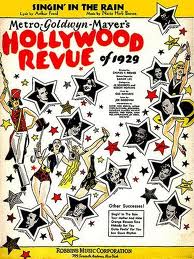
THE HOLLYWOOD REVUE OF 1929
US, 1929, 130 minutes, Black and white and Colour.
Conrad Nagle, Jack Benny, Norma Shearer, John Gilbert, Lionel Barrymore, Marie Dressler, Joan Crawford, Bessie Love, Anita Page, Buster Keaton, Stan Laurel, Oliver Hardy, the Brox Sisters.
Directed by Charles Reisner.
In 1929, MGM won the Best picture Oscar for The Broadway Meldoy. It also released this Hollywood Revue, all filmed on the stage, like a filmed version of a Broadway show. There is the stage, there are curtains, props, very theatrical. This limits the performances as well as the choreography and dancing.
Most of the film is in black and white but there are two colour sequences, the balcony seen from Romeo and Juliet with Norma Shearer and John Gilbert and a final musical number. Already in 1929 there is parody of producers with no taste and who want things modern and speeded up, so director Lionel Barrymore gets Shearer and Gilbert to change the dialogue in contemporary jargon.
The film is an opportunity to highlight some of the MGM stars. Matinee idol, Conrad Nagle, is one of the compere’s and joins in some of the songs. Jack Benny, his comic style was to become very familiar from radio, television and film, shows that he had this style right from the beginning. Joan Crawford appears singing as do Bessie Love and Anita Page. For curiosity, there is music and song and dancing from Marie Dressler. Laurel and Hardy appear as magicians and Buster Keaton has a funny routine.
The Hollywood Revue is definitely an antique, coming as it does at the beginning of sound films. It is also something of a relic with the recorded performances. In does offer an opportunity to see some of the performers in their early years.
Some of the songs are familiar and the film capitalises on songs like You Were Meant for Me and Singin’ in the Rain. It was to be another 23 years until the release of one of MGM’s greatest musicals, Singin’ in the Rain. This film has the cast literally singing in the rain on stage.
The contents of the film is contained in the following paragraph:
THE Hollywood REVUE Program is as follows:
ACT I: "The Palace of Minstrel" (sung and danced by minstrel chorus surprisingly without the use of performers in blackface); "Masters of Ceremonies" (with by Jack Benny introducing Conrad Nagel. Cliff Edwards also takes part in this scene); "I Gotta Feeling for You" (sung by Joan Crawford); "Swanee River" and "Old Black Joe" (sung by chorus); "Low- Down Rhythm" (a lively number sung and danced by June Purcell); "Your Mother and Mine" (sung by Charles King); "You Were Meant for Me" (sung by Conrad Nagel to Anita Page); "Nobody But You" (sung by Cliff Edwards, followed by Jack Benny with his violin playing to the tune of "Your Mother and Mine"); CUT UP (comedy skit featuring William Haines ripping up Jack Benny's suit); "I Never Knew I Could Do a Thing Like That" (sung by Bessie Love); "For I'm the Queen" (sung by Marie Dressler, assisted by Polly Moran); MAGIC ACT (introduced by Jack Benny, featuring the comedy team of Laurel and Hardy as magicians in a comedy skit of errors); MILITARY MARCH (with Marion Davies singing "Oh, What a Man" and "Tommy Atkins on Parade" followed by military drill and dancing. The Brox Sisters conclude this number singing "Strike Up the Band"); INTERMISSION (during this five minute break, the orchestra is seen playing to the tunes of "Nobody But You" and "Your Mother and Mine" in front of the closed curtain).
ACT II: "The Pearl Ballet" (sung by James Burrows, danced by Beth Laemmle and the Albertina Rasch ballet, concluded by "The Dance of the Sea" performed by Buster Keaton); "Lon Chaney Will Get You If You Don't Watch Out" (sung by Gus Edwards); "The Adagio Dance" (with the Natova Company); ROMEO AND JULIET (with John Gilbert and Norma Shearer, with Lionel Barrymore as director); "Singin' in the Rain" (introduced by Cliff Edwards); "Charlie, Gus and Ike" (with Charles King, Gus Edwards and Cliff Edwards); "Marie, Polly and Bess" (with Marie Dressler, Polly Moran and Bessie Love); "Orange Blossom Time" (sung by Charles King to Myrtle McLaughlin?, danced by the Albertina Rasch Ballet); and finale, "Singin' in the Rain" (sung by entire cast).
Published in Movie Reviews
Published in
Movie Reviews
Tagged under
Saturday, 18 September 2021 19:49
Sherlock: His Last Vow
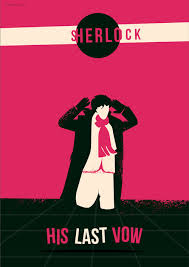
SHERLOCK: HIS LAST VOW
UK, 2013, 90 minutes, Cover.Colour.
Benedict Cumberbatch, Martin Freeman, Mark Gattiss, Robert Graves, Amanda Abington, Louise Brealey, Lars Mikkelsen, Lindsay Duncan.
Directed by Nick Hurran.
His Last Vow is the final film in the third series of Sherlock. The series has focused on some cases but, more particularly, on Sherlock Holmes himself and his personality. Once again he refers to himself as a high-functioning sociopath. But, he does make some attempt at personal relationships, even though Watson and the audience are shocked to see Janine staying at his flat. But he is using her to get to the arch-villain of the film.
We see the arch-villain in action, blackmailing a politician about her husband’s previous indiscretions. She decides to ask Holmes help. Then we see Holmes in a drug centre and assume the worst, as does Dr Watson. However, it is a ploy to give the villain something to hold against him while he tries to retrieve letters.
Everything is not so easy. While Holmes and Watson get into the villains building, with the help of Janine whom Holmes has been cultivating for this purpose, he finds her wounded and then a shooter confronting the villain. In a surprising plot twist, it is Mary Morstan who has a background as an assassin agent. She wounds Sherlock but rings for an ambulance to save him. In the meantime, she has dispatched the villain.
There is a confrontation scene between Mary and Sherlock with Watson as a witness. Then a celebration at the Holmes home, with his parents, Mycroft and the Watsons. Mycroft wants Sherlock out of the country but a crisis arises and he phones the plane after four minutes and Sherlock returns. And so does Moriarty.
1. The end of this series? The cases, the personal focus on Sherlock and his development? The villain, Magnusson? And the appearances of Moriarty?
2. London, the world of politics, media, finance? Mycroft and the Secret Service, interest in Magnusson? The role of Sherlock in this confrontation with Magnusson?
3. Sherlock on the drugs, Watson finding him, the character of Will, addict, his powers of observation, Sherlock hiring him, his participation in the investigations? The drugs as a cover for Magnusson to have grounds for blackmail? The shock of Janine in Sherlock’s flat? His using her? The continued relationship between John, Mary and Sherlock?
4. The opening, the blackmail, the politician, Magnusson and his insinuations, the letters, the effect? The politician and her getting Sherlock involved? The questioning of Magnusson and his device of having the information before his eyes? The audience seeing the details?
5. Magnusson as a character, sinister, his visit to Sherlock’s flat, his words, criticism of the flat, urinating in the fireplace, the defiance? Sherlock and Watson going to his estate and finding that his information was in his memory? His building, his being in the room with Mary, her shooting him?
6. Watson and Holmes getting into the building, the plan, the key, the corruption of the card, Janine letting him in? Her being used? Her being injured? The later visit, the articles denouncing Holmes, her pleasant revenge?
7. Getting into the room, the documents, Mary with the gun, her shooting Sherlock? Her shooting Magnusson?
8. Holmes, his being shot, in his imagination, Mycroft’s advice, the workers at the lab and their indicating the nature of the bullet, the shot, the flow of blood…? His collapsing? Mary and her ringing for the ambulance?
9. The Christmas dinner, the Holmes family, Mycroft and his attitudes, expressing regard for Sherlock, their smoking outside, their parents strict? Sherlock and his putting something in the drink and leaving with Watson?
10. The rendezvous with Mary, the street, the building with her image on the front, the confrontation with Sherlock, the discovery that John was present?
John hearing everything?
11. John and Mary, the USB stick, her giving John everything, not wanting to lose his love, his not listening to it or reading it, the reconciliation?
12. Mycroft getting rid of Sherlock to Eastern Europe, the emergency, calling him back after four minutes?
13. The imagery of Moriarty in the present, the threat to Sherlock? The final television screens –‘Miss me’?
Published in Movie Reviews
Published in
Movie Reviews
Tagged under
Saturday, 18 September 2021 19:49
Need for Speed
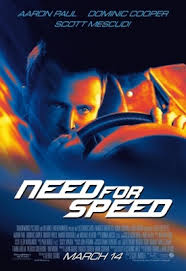
NEED FOR SPEED
US, 2014, 123 minutes, Colour.
Aaron Paul, Dominic Cooper, Imogen Poots, Michael Keaton, Scott Mescudi, Rami Malek, Harrison Gilbertson.
Directed by Scott Waugh.
Some people have a need for speed. Other people have no need for speed. This will be the criterion on which people can make their choice as to whether they see this film or not. It is definitely for the need-for-speeders, mostly definitely not those who have no need for speed.
The niche audience for this film is probably teenage boys, young adult men, though there is quite some attention in the screenplay to make it attractive to young women. It is based on a computer game, plays like a computer game – best not to examine the screenplay minutely for credibility or consistency in detail, the speed and the adrenaline are the thing.
Everybody then makes a comparison with The Fast and the Furious – which a hostile reviewer dabbed ‘The Fast and the Fatuous’. Perhaps it’s too unkind to use this for Need for Speed, but it is a strong temptation…!
The stunts are everything, as well as the way they are photographed and edited, for maximum impact. There is a warning at the end that these stunts were supervised and would be too dangerous for anyone to try them on their own – but, unfortunately, the rush-to-the-exit-as-soon-as-the-credits-loom audience are already on their feet and they will miss this salutary warning.
A couple of young men who run a garage in New York state are the main ones with the need for speed. Toby (Breaking Bad’s popular star, Aaron Paul) is an expert at work, as well as driving. He is also in competition with driver, Dino, who turns out to be more than nasty, (Dominic Cooper). In the background is a millionaire who whose adrenaline activity is hyper. He is played by Michael Keaton something in the way that he did 30 years earlier (hyper) when so many of his characters and their performances were frantic. He runs a secret and illegal competition, so we know that by the end Toby and Dino will have a confrontation. And they do.
However, there is some drama in the meantime, the young men having access to Mustangs with power to go over 200 mph. Something goes wrong during a race, Toby behaves well, Dino does not and Toby has to bear the consequences.
Two years later, Toby has the opportunity to drive in the secret race. Dino is already a candidate. But it does mean that Toby has to drive from New York to California in 44 hours – which gives a lot of opportunity for high speed, police chasing, helicopter guiding and pursuing, a range of American scenery, especially in the Colorado-Arizona? area, plenty of stunt work. Toby is accompanied by Julia, Imogen Poots, a British expert in handling the sales of cars. It is her expert driving in the western states that is the film’s reaching out to female audiences.
It is silly to be too critical of this kind of film. Motor fans will enjoy it immensely. Surprisingly, there is scarcely a swear word, no delaying over sex scenes and the nudity is by way of a joke! And, all things considered, it does achieve what it sets out to do, a night out for petrolheads (or whatever name is appropriate for the fans).
1. The niche audience? Motor fans? A satisfying entertainment for them?
2. The film based on a computer game? Contents, style, competitiveness? Goodies and baddies?
3. The settings over the US, New York, Arizona, Colorado, California? The landscapes? The musical score?
4. The title, and audiences with a need for speed?
5. Tobey and his friends, their work, the cars, bonds, friendships? Tobey testing the cars? Speed? The rivalry with the Dino?
6. Julia, British, her style, sales pitch, decisions?
7. The three-car race, Pete and his being killed? Dino and his disappearance from the race? Tobey and the police? His going to prison?
8. Two years later, getting out, parole and not leaving the state, getting the car, the millionaire, Julia? An opportunity to race?
9. The drive across America with Julia, the stunt work, the relationship, her driving?
10. The helicopter, his friend, giving advice? The helpers? Finn and his taking off his clothes and the jokey episode? Their continued support, refilling the car while driving?
11. The range of cases, the police, the crashes?
12. Michael Keaton as the millionaire, his control, money, communication? His frantic behaviour and excitement? everybody watching the race? Even from prison?
13. Dino, his arranging for bounty hunters, the shooting at Tobey? The confrontation in the hotel in San Francisco? The car overturned in the San Francisco street?
14. Anita, love for her brother, relationship with Dino? Her disillusionment? Giving Tobey the information to get the car?
15. Tobey, arriving just in time for the race? The drama of the race, the range of police in pursuit, crashes, chases?
16. Tobey swerving and Dino crashing, Tobey returning to save him? Dino and the arrest, going to prison? Toby and Julia and happy ever after?
Published in Movie Reviews
Published in
Movie Reviews
Tagged under
Saturday, 18 September 2021 19:49
Blind Massage/ Tui Na
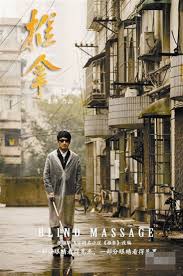
BLIND MASSAGE/TUI NA
China, 2014, 114 minutes, Colour.
Directed by Lou Ye.
Blind Massage may have had great success in its country of origin, but although it has received good critical reviews, it is probably very difficult for an audience outside China to comprehend what is going on. A big part of the difficulty is identifying each of the characters and being able to stay with them in their interactions and their character development.
The film offers background to a phenomenon that is prominent in China, blind men and women being able to perform massage and having a great number of clients. There is a great deal of detail of work in these establishments.
The opening of the film focuses on a young boy who loses his sight in an accident and is introduced to surviving by sound. As an adult he is introduced to massage, and makes connections with fellow-workers. There are two blind leaders, who are referred to as Boss, whose lives audiences also follow, especially one who has difficult financial situations.
The young blind man also becomes friendly with a prostitute in a brothel, and this also for forms part of the plot development. Surprisingly, later, he is assaulted and bashed and recovers something of his sight – and then disappears from the film.
The style of the photography also make some difficulties in some audiences, hand-held camera work as well as colour grading which is often murky, perhaps using this atmosphere and sometimes darkness for audience understanding of the difficulties for the blind masseurs.
A sympathetic story and characters studies which should repay attention – but singling out which character is which as well as the stylistic difficulties with colour grading and darkness, it has difficulties in gaining a wide audience.
Published in Movie Reviews
Published in
Movie Reviews
Tagged under
Saturday, 18 September 2021 19:49
Hannah Arendt
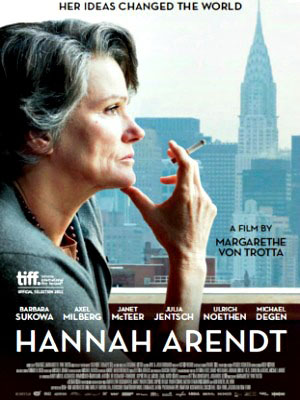
HANNAH ARENDT
Germany/Israel/Luxembourg, 2013, 113 minutes, Colour.
Barbara Sukowa, Janet Mc Teer, Axel Milbert.
Directed by Margarethe von Trotte.
Hannah Arendt was a significant thinker in her time. She had written on the Origins of Totalitarianism and was appreciated as a philosopher. Jewish, she had escaped with her mother from Germany in the late 1930s to the United States and became an American citizen. She lectured in New York and was esteemed as a woman of depth and intelligence.
This is a film which is of interest to those who know about Hannah Arendt, her life and career. It will also be of interest to those who know little about her but want to find out her contribution to 20th century thinking. If an audience is not interested in Hannah Arendt and her work, they will find this sometimes detailed look at her and her philosophy hard going, or too-hard going.
The director, Margarethe von Trotte, has had a long career in film and has concentrated so many times on significant women and women’s issues. Her leading lady for Hannah Arendt, Barbara Sukowa, has appeared in several of the director’s films playing, amongst others, Rosa Luxembourg and Hildegard of Bingen. Here she creates a very strong impression as Hannah Arendt.
The principal focus of the film is Hanna and on Adolf Eichmann, his being taken by Israeli agents in Argentina, his extradition to Jerusalem and his trial, where he was held in a glass cage, and ultimately found guilty of the charges and hanged.
Hannah Arendt asked the editor of the New Yorker to report on the trial. Her husband, Heinrich, was against her going. But, wanting to ground her philosophical reflections in facts and experience, she was determined to go. The film has some brief scenes of the trial, Hannah sitting in the benches, working in the press room watching the television screen, and some actual television footage of Eichmann himself, the prosecutor and the judge. There are several re-enactments, as well as footage, of some of the witnesses and their emotional response to the treatment of the Jews and the Holocaust. Looking at Eichmann, we see a small man, very ordinary-looking, a bureaucrat rather than any charismatic leader. This was to be the core of Hannah Arendt’s comments on the trial.
After the publication of the articles in the New Yorker, there was a groundswell against Hannah. Jewish authorities and many of the Jews, whether they had read her articles or not, felt that she had betrayed her people, especially with her comments about the complicity, witting or unwitting, of some Jewish leaders with the Nazi authorities and so being responsible for more deaths of Jews. For many this was incomprehensible, leading to hostile phone calls, letters and death threats.
But Hannah Arendt was a strong character, accused of arrogance (which is displayed in the film) and a lack of feeling. However, influenced by the philosopher, Martin Heidegger, with whom she had a relationship when she was a student, rejecting him when he affirm Nazism and later visiting him to ask him to make a public apology, she was a philosopher who was also passionate, invoking ‘passionate thinking’.
The dramatic finale to the film is a lecture she gave at the New York New School, in the presence of the University officials who wanted her resignation, and to a full room of students. It is here that she speaks the phrase which most people know, even if they do not know who originated it, ‘The Banality of Evil’. Eichmann was an ordinary man, a bureaucrat, not a man with a vision or leadership qualities, but someone who obeyed orders because he believed in the authority and that the authority should be obeyed, passing on his orders to others who fulfilled them while he was detached, not even knowing necessarily what the consequences were. This is a particularly important message at any time, but particularly now, where communications and social media give us immediate information and a multitude of opinions.
Perhaps this film is more of a visual lecture about Hannah Arendt than an inventive cinema experience. But, to the extent that it portrays Hannah, her ideas, and the controversies about the Eichmann trial and her reporting, it is worth seeing.
1. Audience interest in Hannah Arendt? Hannah Arendt herself, her career, her reputation, controversy? The Eichmann trial? The reactions? ‘The Banality of Evil’?
2. The work of the director, her career, films about significant women? Barbara Sukowa and her role in the director’s films?
3. Audience knowledge? Information? Character, the trial and the actual footage? The articles in the New Yorker? Hannah Arendt’s philosophy? The Origins of Totalitarianism?
4. New York, the 1960s, the University, apartments? The sequences in Israel, the landscapes, the city of Jerusalem? The trial? The use of English and German? The musical score?
5. Hannah Arendt and her story, the past and the flashbacks, her study, interest in philosophy, the relationship with Martin Heidegger? Loving him? Lectures? Her visits? His visits to her? His emphasis on Thinking? His affirmation of the Nazis? Hannah revisiting him, urging a public apology? His reasons?
6. The relationship between Hannah and Heinrich, the years, together, from Germany, to New York, their love? Communication? His reservations about her going to Jerusalem? His collapse and illness? Hannah’s love and support? His support for her?
7. Mary Mc Carthy, the introduction to the film, the chatting about relationships, the touch of scandal? Mary Mc Carthy and her social background, literary, her friendship and support? especially in the controversy? Playing pool – and her cheating?
8. Hans, his place in Hannah’s past, action in the past? Hannah in the camp? Her memories, leaving, bringing her mother to America? The meetings at her apartment, the discussions, Heinrich and his antagonism? Hans and his attending her lecture, turning against her?
9. Lotte, her secretarial work, friendship, looking after Heinrich, the vigil with Hannah, reading the letters?
10. Lore, the other women, friendship and support?
11. The University, the lecturers, her reputation, staff, meetings, rapport with the students?
12. The opening, the bus, the men walking along the road, capture? The taking of Eichmann by the Israelis? The articles in the New York Times? Hannah’s reaction? Her going to Israel, her presence of the trial of Eichmann, in the benches, in the press room? Her fears that it would merely be a show trial? The picture of the prosecutor, the judges, the witnesses, the public, watching on the television screen? The attitude of the judge, the words of the prosecutor, the collapse and emotions of the witnesses? Hannah’s reports, reactions?
13. Hannah and the Origins of Totalitarianism, philosophical treatment? Wanting to witness the trial to anchor her reflections in facts? And yet her developing a philosophy of evil?
14. The effect of the trial on her, seeing Eichmann is a criminal, deserving of hanging? But her reservations about him as a person, as mediocre, as a bureaucrat, his attitude towards obeying orders? Machinery of people obeying orders rather than the focus on the significant evil leaders?
15. The delay in writing, the editor of the New Yorker, his advisers and the reservations? His phone call to Hannah? Her finishing? His comment on her grammar? The discussions about the issues?
16. Hannah, her opinions, seeming as arrogant, non-feeling? Incisive but intransigent?
17. The issue of the Jewish leaders and their complicity in the fate of the Jews? The Jewish reaction, whether people had read her articles or not?
18. The issue of Eichmann as mediocre and the consequences of his obeying orders, passing on situations to the next bureau and his not see feeling responsible?
19. The attacks on Hannah, the readers, the Jews, letters, calls, vicious cards, death threats? The lecturers at the University, their meeting with her, wanting her to resign, their presence at her lecture, walking out?
20. Her own reaction, Heinrich and his support, her being away, going to visit Kurt in Israel, his turning his back on her after all that they had been through?
21. The dramatic climax with the banality speech, the packed room, the students, the question, her explanations, the applause? Hans and his turning against her? The authorities walking out?
22. The aftermath about her career and her continued pursuit of the philosophy of evil until her death in 1975.
Published in Movie Reviews
Published in
Movie Reviews
Tagged under
Saturday, 18 September 2021 19:49
Sherlock: The Sign of Three
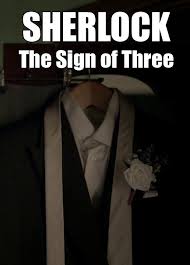
SHERLOCK: THE SIGN OF THREE
UK, 2013, 90 minutes, Colour.
Benedict Cumberbatch, Martin Freeman, Rupert Graves, Amanda Abbington, Una Stubbs, Mark Gattiss.
Directed by Colm Mc Carthy.
This is the second film in the third series of Sherlock. Its main focus is on the wedding between Dr Watson and Mary Morstan. There are various comic touches, especially in the development of the character of Sherlock, who characterises himself as a high-functioning sociopath.
The film opens with a comic touch, Inspector Lestrade being called to a series of bank robberies and, about to arrest the criminals, receiving a desperate text from Baker Street – but it is only Sherlock Holmes wanting advice in preparation of his speech to be best man at the wedding. There are several humorous flashbacks as different people are interviewed by Holmes for their behaviour at the wedding. Many of the characters make humorous observations about Holmes and his role.
After the ceremony, he makes a long speech, discarding the telegrams, focusing on himself and communicating his warmth towards his friend, Dr Watson. In his speech he refers to several cases, especially one that he could not solve. Then this becomes part of the wedding meal scenario, an attempt on a life, the revelation of an unexpected killer which also solves the previous case.
The structure of the film is quite complex, moving around in time, and, sometimes in Sherlock’s imagination, especially in interview with various women in contact with the killer, and imagining Mycroft and others guiding him in his detection.
The new direction of exploring Sherlock’s character gives even more scope for Benedict Cumberbatch to display a complex character. On the other hand, Dr Watson is preoccupied with his marriage.
1. The popularity of the series? The change of character in the third series – more personal development? While Sherlock is still an enigma?
2. The focus on the wedding, on Sherlock’s friendship with Watson?
3. The structure: the focus on the wedding, but the various flashbacks, to the friend of Mary, to the boy? The planning, the serviettes like the Sydney Opera House? Sherlock and his composing for the violin, practising dancing?
4. The initial joke, Lestrade and the frustration of the bank robberies – and the text from Baker Street, the backup? Sherlock wanting help about writing his speech?
5. The wedding story, dressing, going, after the ceremony, the photos, the guests, the dinner? Sherlock and his awkwardness, being best man? The telegrams and discarding them? His notes? Talking about John? The cases, the variety of glimpses and the flashbacks? The murder of the Grenadier guard? Unable to solve it? The murder attempt at the wedding? Solving it? Finally dancing and playing, almost flirting with Janine? Talking to John and Mary about the pregnancy – the sign of three?
6. Benedict Cumberbatch and his portrayal of Sherlock, a high-functioning sociopath? The bonds with John, difficulties in expressing it, language? With Mrs Hudson? The interactions with Mary? Lestrade, present at the wedding? The Q&A about the killing, asking Lestrade, Tom and his theory? The visuals of the clues, the words, Mayfly, target? Solving of the case? The summary of the cases?
7. The Mayfly issue, the various women, the woman coming to see Holmes, he and Watson drinking out on the town, the aftermath? The image of the various women and the connections with the Mayfly? The knowledge of Watson’s name, Hamish?
8. The Grenadier guard, the stalker, Watson and Sherlock arriving, the military treatment of Watson, the dead guard, the doctor’s help, still breathing, saving a life and commended by Holmes?
9. Mycroft, the discussions, his influence, not going to the wedding?
10. Mayfly, too many possibilities? The emphasis on Holmes and thinking? Targets, clues? Sholto in his room? Mary knowing the number? Sholto and his comment about dying in uniform, the knife inserted through the uniform? Watson saving him?
11. The solution, Sherlock’s method, the photographer and his motivation?
12. The blending of personal story with case study?
Published in Movie Reviews
Published in
Movie Reviews
Tagged under
Saturday, 18 September 2021 19:49
Blackfellas/ Day of the Dog
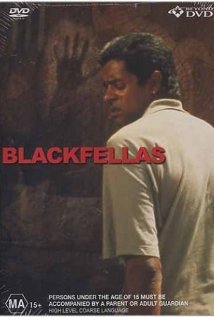
BLACKFELLAS/ DAY OF THE DOG
Australia, 1993, 90 minutes, Colour.
John Moore, David Ngoombujarra, Jaylene Riley, Lisa Kinchella, John Hargreaves, Jack Charles.
Directed by James Ricketson.
Those who don’t “fit in” to expected niches are considered odd, even unwelcome, by “ordinary people”. This is one of the themes of Blackfellas.
Blackfellas can be recommended; perhaps it ought to be seen by the wide Australian audience. It is not comfortable viewing, but it offers a story that is involving and the story offers a message without preaching, a story of urban aborigines.
David Ngoombujarra won the Best Supporting Actor award at the Australian Film Institute awards of 1993. His role is Pretty Boy, trapped in the hassles of life in Perth, thief and potential football champion. John Moore, who appeared in Deadly, was nominated for Best Actor as Doug, a young man battling and increasingly finding that he is also trapped.
Director James Ricketson adapted the novel Day of the Dog, with its author, Archie Weller, to ensure that it spoke to aborigines and not just about them. The picture is realistic, unflattering at times, but has strong feeling. The audience is caught up in the desperate hopes that all will go well when it is obvious that they cannot.
Doug tries to understand his heritage, mixed race, tries to break free and go to the land to train horses but is prevented by family bonds and friendships.
This being trapped is reinforced by John Hargreaves’ smiling sinister policeman – a stereotype, perhaps, but chillingly alarming – courts, police brutality, prisons.
Audiences could benefit by seeing this compellingly challenging story of realities which most tend to bypass or ignore.
1. The popularity of the novel? The author’s perspective, the writing and collaborating with the director?
2. The two titles, given emphases?
3. Australia, the 1980s and nineties, the country towns, the aboriginal communities, the interactions, deals and thefts, football teams, the prejudice of the
police, life in prison?
4. The director, the small budget, his interest in issue films?
5. The thugs and Doug, leaving prison, his reacting to the bad treatment of prisoners, getting out, Pretty Boy and the car, Doug and his suspicions, thinking it stolen, getting in? Doug and his moods and changes of moods? Going to the pub, drinking, wanting the shandy, Pretty Boy changing the drinks, the effect? Holly and the attraction? Yet her going with other men? Going home, his mother, his mixed race background? His mother marrying his father, the father leaving, drinking, going to jail? The buying of the land and relinquishing it? His mother urging him to get a job, as a mechanic, his not wanting to do that work? His love for horses, given employment by Foley, his good work? Going to the property, the feel of the land, his belonging? Wanting to buy it back? His attempts to avoid prison, but giving in to the stolen car, running from the police? His anger and the knife with Silver? His relationship with Polly? The police, passions, interrogations, holly and the jewellery, her arrest, Maxwell and his disdain? Life and the farm, his work with the horses, Polly not wanting to go to the country? In court, Foley giving testimony in favour of Doug? Pretty Boy and the football, Doug urging him to play, the failure, their happiness and friendship, Pretty Boy not visiting prison, causing the trouble that led to Doug’s going to prison, Doug and his future, going to visit Polly prison, her getting out, meeting her again, but a possible future?
6. Pretty Boy, his life, the work, friends, the fight and the knife and Doug going to jail? Meeting Doug at the prison, but not visiting him? The car, jovial, Valerie and the relationship, her pregnancy, his pride, yet his violence towards her? The shandy and getting Doug drunk? The bar, playing pool? The thefts, the cash, the deals with Silver? Wanting to borrow money from Doug? The football, his skills, the lack of discipline, the argument with the coach, his being fired? His violent reaction? The stealing of the car, with Silver, the final fights, Doug’s friendship, Pretty Boy’s choices?
7. The other members of the group, their friendship, life in the town, drinking, pool, supporting each other?
8. Doug’s mother, her background, love for her husband, his leaving, her hard work, wanting Doug to get the job? Yet her love for him?
9. Valerie, with the group, Pretty Boy, the violence, her pregnancy?
10. Polly, young, her life and the town, sexual relationships, attracted to Doug, not wanting to go to the farm, arrested because of the stolen jewellery, in prison, getting out?
11. The importance of football and the town, the team, the sport, Pretty Boy and his being unreliable?
12. Maxwell, the police, harsh and racist attitudes, exercise of power, violence, mean-minded?
13. A glimpse of life in a country Australian town?
Published in Movie Reviews
Published in
Movie Reviews
Tagged under
Saturday, 18 September 2021 19:49
Colour Me Kubrick
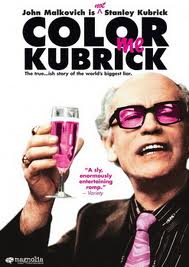
COLOUR ME KUBRICK
UK, 2005, 86 minutes, Colour.
John Malkovich, Jim Davidson, Robert Powell, Henry Goodman, Terence Rigby, Peter Bowles, Leslie Phillips, Richard E. Grant, Honor Blackman.
Directed by Brian Cook.
Colour Me Kubrick is an entertaining trifle. It is based on what the film calls a true…ish story, the tale of a London conman, Alan Conway, who retired went about London passing himself off as director Stanley Kubrick. Watching his exploits, it is quite amazing what he got away with.
The film opens amusingly with two young men looking like Alex and a droog from A Clockwork Orange, but they are really debt collectors trying to find Conway. They meet an uppercrust couple, Leslie Phillips and Honor Blackman, and have to retreat. What follows is a range of escapades as Conway moves around London, very gay, very camp, unsure of his identity, sometimes thinking he is actually Kubrick and seems more real when he passes himself off as Stanley. He picks up young men, promises them the world for his new film, gets money out of them. He also gets money from a pharmacist, and promises the world to a man who is setting up his bars around the world. His final big target is a provincial singer whom he encourages to think about a career in the United States and in Las Vegas.
Eventually members of the press catch up on him, he spends some time in an institution where his doctor believes every word, but eventually he dies in1998 and his legend begins.
He is eccentrically played by John Malkovich, relishing the manner and style of Conway. There are many British character actors in brief supporting roles including Leslie Phillips, Honor Blackman, Robert Powell, Peter Bowles and Richard E Grant.
1. A true story? True…ish?
2. The story of a conman, the nature of conmen, manner, style? Interactions with people? Cadging? Promises? Ruining people’s hopes with expectations? Care-free? Ingenuous? The capers, the information for the press, his being in an institution, court, dying?
3. The title, Stanley Kubrick and his career, reputation, in England, the recluse?
4. John Malkovich and his impersonation of Alan Conway? His knowledge of Kubrick yet his ignorance of his films, being caught out about Judgement in Nuremberg? His talk and various accents? Pompous style? Gay and very camp? his clothes? Interactions, an opportunist?
5. The question of identity, his later discussions about who was real, Conway or Kubrick, his real self? The use of names? Stanley? His identity as Kubrick and feeling real? the challenges to himself to others?
6. The opening, the very British couple, the men at their door, the importance of their address, Conway using it, waiting for cars to turn up and hiding? The introduction to the theme and the tones of Kubrick, especially the young men looking like droogs from A Clockwork Orange? And the musical score?
7. The opening and the parody of A Clockwork Orange? The fact that the young men were collecting money?
8. The use of Kubrick scores, 2001, Clockwork Orange, plus the range of songs, especially for Lee, Viva Las Vegas?
9. Conway and his range of encounters, the bar and the designer, flattering him, sexual intent, promising him to be designer on his new film, at his home, the later phone calls and concern? The managers of the band, the enthusiasm, talking in the car, going to see the band, Conway borrowing £20 for vodka, the accusation during the performance, his disappearance? The taxi driver? offering him a part in the film, fleecing him of £40, the taxi driver going to the police, their threat about the roadworthiness of his car? The owner of the clubs, his enthusiasm and his lawyer, borrowing the money, all the talk about the New York office and documents, the later experience of the losses? The pharmacist, the talking in the shop, wanting to manage a rock band, he and his wife invited to the home, the discussions, his borrowing money from them and the false check?
10. Conway, his devices, the plausibility, the promises? His life of hedonism and enjoying it?
11. Those tricked by Conway, the interviews, but not wanting to appear in court, the danger to their reputations?
12. Robert Powell as the journalist, the investigations, his talking to camera, his interviews with Conway?
13. Lee, the chatter about his reputation, the gossip, the party, Lee singing, the manager, Conway and his spiel, everyone believing him, the spin about
Las Vegas, expenses, living in comfort? Lee and his performance? The discussions with the manager, all expenses paid? The manager, the discovery of the magazines? The truth? Lee and the confrontation, Conway going into the water?
14. Conway in the institution, the discussions with the doctor, her paper, his wanting a royalty, her complete belief in him?
15. His friend from France, selling up and moving to London, disillusionment, discussion about his identity? Conway, desperate, confessing the truth?
16. The end, the portrait of Conway for the final credits, the final information about him, his life and his death?
Created by: malone last modification: Tuesday 05 of November, 2013 10:00:39 by malone
Published in Movie Reviews
Published in
Movie Reviews
Tagged under
Saturday, 18 September 2021 19:49
Sherlock: Hounds of Baskerville
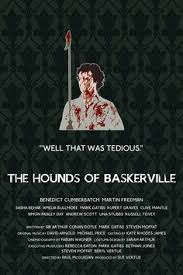
THE HOUNDS OF BASKERVILLE
UK, 2012, 90 minutes, Colour.
Benedict Cumberbatch, Martin Freeman, Lara Pulver, Mark Gattis, Rupert Graves, Andrew Scott, Una Stubbs, Russell Tovey, Clive Mantle.
Directed by Paul Mc Guigan?.
The Hounds of Baskerville is part of the second series of television’s Sherlock. The second series was considered an advance on the first series.
The strong aspect of the second series is how the original stories have been updated and adapted for the 21st century. This is especially the case for this film, based on one of Conan Doyle’s most popular novels.
The setting is an installation in the English countryside which experiments on animals, especially for military purposes and instilling fear. Its name is Baskerville. Several of the names from the original story have been transferred to this version. And there is a parallel of the hound appearing on the moors.
Benedict Cumberbatch excels as Sherlock, with this his fifth film in the role. Martin Freeman is also a very good as Dr. Watson. Rupert Graves appears as Lestrade.
As with the original, this story remains more focused on the central plot while many of the other films which have several subplots.
Once again, the film has been directed by Paul McGuigan?.
1. The popularity of the series? Benedict Cumberbatch? Martin Freeman? The perennial popularity of Sherlock Holmes? The ingenuity of Conan Doyle’s stories?
2. Sherlock Holmes in the 21st century? An adept the basis of Conan Doyle’s Hound of the Baskervilles? The adaptation, a contemporary reworking of the plot? Well-known characters, parallels and differences?
3. London and the 21st century? The contrast with the moors and woods, crags? The atmosphere? The Baskerville plant, security, mine field?
4. The visits to the plant? The depth, the lifts, security, the laboratories, the animals?
5. The hound, the visual effects, and night, dark, fears? Narcotics?
6. Sherlock bored, needing a fix, his carrying on, searching for the drugs, Watson’s refusal? His need for investigating a case?
7. Henry Knight, the prologue, the boy, his father’s death, the hound, the night and the fear, his imagination, therapy? His sessions, the sympathetic therapist,
the gun and his threatening her? Coming to Holmes, his story? Sherlock not interested? His change of mind? The word, hound, and its meaning? Henry’s growing desperation, participation in the case?
8. The visualizing of Sherlock’s thoughts, his mind, diagrams, his mind working?
9. Going to the moors, the site of the attack, Sherlock going later, seeing the hound, his fear?
10. Going to the plant, Mycroft’s card, the corporal and his showing everything? Doctor Frankland and his welcome, his card, cell phone number? The American giveaway? The laboratories, Doctor Stapleton, her animal experiments? The issue of the coloured rabbit’s case and Sherlock rejecting it? The connection? The superior officer, hostility? Their being caught, escorted out, threatened? The personality of the superior officer, and Sherlock’s working out his password, the connection with Mrs. Thatcher and his admiration for her?
11. The speculation about H. O. U. N. D.? Liberty in? Sherlock’s deductions and their being seen, the solution, Indiana, his research, the photo of the group, Frankland in it?
12. The experiments, the animals, the creation of fear? As a military strategy? Watson and his search, experiencing the hound, his fear, hiding? Phone call
to Sherlock, released, Sherlock experimenting, whether for narcotics was in the sugar?
13. The media and the story of the hound? Tours and tourists? The tourist guide, getting information, the bet for 50 pounds? The owners of the pub, the talk, the docket for the meat, the dog? Their being partners? The capitalizing on tourism, not killing the dog, its later attack?
14. The solution, the narcotics in the fog?
15. The finale, Henry and the gun and the therapist? Watson’s discussion with the therapist and his being exposed? On the moors, inspector Lestrade, the attack, the shooting? Henry’s desperation? The arrival of Dr. Frandland? The explanation, Henry and remembering and threatening Dr. Frankland experiments? Going into the minefield, his death, deliberate and the audience seeing his thinking?
16. The character of Sherlock in himself, Watson and his character, their friendship, innuendo about them, the blog, people reading Watson’s blog, admiring Holmes?
Published in Movie Reviews
Published in
Movie Reviews
Tagged under